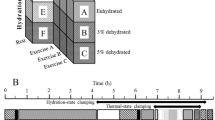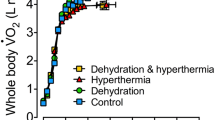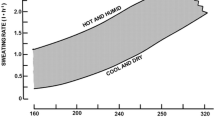Summary
This study examines the effect of the initial state of hydration on hormone responses to prolonged exercise in the heat. Five subjects at two initial hydration levels (hypohydrated and hyperhydrated) were exposed to a 36°C environment for 3 h of intermittent exercise. During exercise, the subjects were either fluid-deprived, or rehydrated with water or an isotonic electrolyte sucrose solution (ISO). Both the stress hormones, adrenocorticotropic hormone and cortisol, and the main fluid regulatory hormones, aldosterone, renin activity (PRA) and arginine vasopressin (AVP), were measured in blood samples taken every hour. Prior hyperhydration significantly reduced initial AVP, aldosterone and PRA levels. However, except for AVP, which responded to exercise significantly less in previously hyperhydrated subjects (p<0.05), the initial hydration state did not influence the subsequent vascular and hormonal responses when the subjects were fluid-deprived while exercising. Concurrent rehydration, either with water or with ISO, reduced or even abolished the hormonal responses. There were no significant differences according to the initial hydration state, except for PRA responses, which were significantly lower (p<0.01) in previously hyperhydrated subjects who also received water during exercise. These results indicate that prior hydration levels influence only slightly the hormonal responses to prolonged exercise in the heat. Progressive rehydration during exercise, especially when extra electrolytes are given, is more efficient in maintaining plasma volume and osmolarity and in reducing the hormonal responses.
Similar content being viewed by others
References
Brandenberger G (1985) Cortisol responses to exercise and their interactions with diurnal secretory peaks. In: Fotherby K, Pal SB (eds) Exercise endocrinology. De Gruyter, Berlin, pp 47–64
Brandenberger G, Candas V, Follenius M, Libert JP, Kahn JM (1986) Vascular fluid shifts and endocrine responses to exercise in the heat: effect of rehydration. Eur J Appl Physiol 55:123–129
Candas V, Libert JP, Brandenberger G, Sagot JC, Amoros C, Kahn JM (1986) Hydration during exercise. Effects on thermal and cardiovascular adjustments. Eur J Appl Physiol 55:113–122
Candas V, Libert JP, Brandenberger G, Sagot JC, Kahn JN (1988) Thermal and circulatory responses during prolonged exercise to different levels of hydration. J Physiol (Paris) 83:11–18
Convertino VA, Keil LC, Bernauer EP, Greenleaf JE (1981) Plasma volume, osmolarity, vasopressin, and renin activity during graded exercise in man. J Appl Physiol Respir Environ Exerc Physiol 50:123–128
Costill DL, Fink WJ (1974) Plasma volume changes following exercise and thermal dehydration. J Appl Physiol 37:521–525
Costill DL, Branam G, Fink W, Nelson R (1976) Exercise induced sodium conservation: changes in plasma renin and aldosterone. Med Sci Sports 8:209–213
Dill DB, Costill DL (1974) Calculation of percentage changes in volumes of blood, plasma and red cells in dehydration. J Appl Physiol 37:247–248
Finberg JPM, Katz M, Gazit H, Berlyne GM (1974) Plasma renin activity after acute heat exposure in nonacclimatized and naturally acclimatized man. J Appl Physiol 36:519–523
Follenius M, Brandenberger G, Reinhardt B, Simeoni M (1979) Plasma aldosterone, renin activity, and cortisol responses to heat exposure in sodium depleted and repleted subjects. Eur J Appl Physiol 41:41–50
Follenius M, Brandenberger G, Oyono S, Candas V (1982) Cortisol as a sensitive index of heat-intolerance. Physiol Behav 29:509–513
Fotherby K, Pal SB (1985) Exercise endocrinology. De Gruyter, Berlin
Francesconi RP, Sawka MN, Pandolf KB (1983) Hypohydration and heat acclimation: plasma renin and aldosterone during exercise. J Appl Physiol Respir Environ Exerc Physiol 55:1790–1794
Francesconi RP, Sawka MN, Pandolf KB (1984) Hypohydration and acclimation: effects on hormone responses to exercise-heat stress. Aviat Space Environ Med 55:365–369
Francesconi RP, Sawka MN, Pandolf KB, Hubbard RW, Young AJ, Muza S (1985) Plasma hormonal responses at graded hypohydration levels during exercise-heat stress. J Appl Physiol 59:1855–1860
Francis KT (1979) Effect of water and electrolyte replacement during exercise in the heat on biochemical indices of stress and performance. Aviat Space Environ Med 50:115–119
Francis KT, MacGregor R (1978) Effect of exercise in the heat on plasma renin and aldosterone with either water or a potassium-rich electrolyte solution. Aviat Space Environ Med 49:461–465
Galbo H (1983) Hormonal and metabolic adaptation to exercise. Thieme, Stuttgart
Gianotti P, Manneli M, Fiorelli G, Serio M (1974) Radioimmunoassay of plasma aldosterone. J Nucl Biol Med Allied Sci 18:104–108
Greenleaf JE, Sciaraffa D, Shvartz E, Keil LC, Brock PJ (1981) Exercise training hypotension: implications for plasma volume, renin, and vasopressin. J Appl Physiol Respir Environ Exerc Physiol 51:298–305
Haber E, Koerner R, Page LB, Kliman B, Purnode A (1969) Application of radioimmunoassay of angiotensin I to the physiologic measurements of plasma renin activity in normal human subjects. J Clin Endocrinol Metab 23:1349–1356
Harrison MH, Edwards RJ, Leitch DR (1975) Effect of exercise and thermal stress on plasma volume. J Appl Physiol 39:925–931
Kirk RE (1968) Experimental design: procedures for the behavioral sciences. Brooks/Cole, Belmont, Calif
Sawka MN, Francesconi RP, Young AJ, Pandolf KT (1984) Influence of hydration level and body fluids on exercise performance in the heat. JAMA 252:1165–1169
Smiles KA, Robinson S (1971) Sodium ion conservation during acclimatization of men to work in the heat. J Appl Physiol 31:63–69
Vescei P, Peuke B, Katzy R, Back L (1972) Radioimmunological determination of plasma cortisol. Experientia 8:1104–1106
Wade CE (1984) Response, regulation, and actions of vasopressin during exercise: a review. Med Sci Sports Exerc 16:506–511
Wade CE, Claybaugh JR (1980) Plasma renin activity, vasopressin concentration, and urinary excretory responses to exercise in men. J Appl Physiol Respir Environ Exerc Physiol 49:930–936
Author information
Authors and Affiliations
Rights and permissions
About this article
Cite this article
Brandenberger, G., Candas, V., Follenius, M. et al. The influence of the initial state of hydration on endocrine responses to exercise in the heat. Europ. J. Appl. Physiol. 58, 674–679 (1989). https://doi.org/10.1007/BF00418516
Accepted:
Issue Date:
DOI: https://doi.org/10.1007/BF00418516




